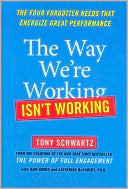The Managerial Moment of Truth: The Essential Step in Helping People Improve Performance
Citing the long-term consequences of unchecked, substandard worker performance, a guide for managers shares strategies on how to address minor mistakes and ineffective work habits at their earliest stages while building fairer, interdependent employment teams. 35,000 first printing. From Publishers Weekly The inherent awkwardness of evaluating an employee's or team's performance may cause managers to avoid confrontation altogether, resulting in work not done right, tension...
Search in google:
The Managerial Moment of Truth explains a powerful new concept that can dramatically improve performance and increase productivity, at no cost, in virtually any company or organization. Developed by organizational consultant and bestselling author Robert Fritz and proven in practice by coauthor Bruce Bodaken, the chairman, president, and CEO of Blue Shield of California, the book provides a dynamic technique to help people face up to reality and confront the truth in order to correct mistakes, learn from past performance, and adjust processes to build a more successful organization.Given human nature, most managers, when faced with the harsh facts of substandard performance, tend to soften the truth with their direct reports, so as not to offend or upset them. They tend to avoid mentioning mistakes, missed dates, an incomplete project, unacceptable quality of work, and the like. Then, if the problem becomes egregious, the manager may suddenly overreact with a contentious confrontation that results in little long-term behavior change. Or else the manager will try to work around the substandard performance, shifting the workload to top performers on the team rather than addressing reality directly with the person concerned. Bodaken and Fritz provide a step-by-step approach for continuous improvement, in which managers deal with performance issues early on, to help employees face the truth without being made to feel denigrated, inept, or incompetent -- which would only defeat the desired goal of improvement. Moreover, this approach also greatly enhances the manager's own career success.When managers understand and use this practice, they can produce more topperformers and add from 25 to 40 percent more actual capacity to their organization. At Blue Shield of California, for example, more than one thousand managers have been trained in this approach, with impressive, measurable results, helping the company become one of the fastest-growing health care plans in the state. Other companies, all at the top of their industries, are now using MMOT with great success. As widely acclaimed author Peter Senge notes in his foreword, "This is not a book with just a bunch of 'good ideas.' It is a call to a simple but transformative practice, vital to building an organization truly worthy of people's highest achievement." Publishers Weekly The inherent awkwardness of evaluating an employee's or team's performance may cause managers to avoid confrontation altogether, resulting in work not done right, tension between employees and unnecessary strain on high performers. In this guide, Bodaken, CEO of Blue Shield of California, and Fritz (Corporate Tides) delineate a methodology of "truth telling'' in order to curb bad habits early on and institutionalize good behaviors. A proper approach to "managerial moments of truth" (MMOTs)-which the authors define as a manager's awareness of her unmet expectations, followed by the decision about how to handle them-will add capacity without cost, Bodaken and Fritz claim. Their four-step technique first requires manager and employee to "acknowledge the truth" or agree on what happened. Then they analyze together how the situation occurred, establish an action plan and finally put a feedback system in place. The book provides a variety of case studies, which show how to provide individual feedback and team evaluations, plus how to deal with repeat offenders or an employee/team mismatch. With dozens of sample conversations throughout, the authors present an action-oriented communication technique they believe will improve the managerial process and thus a company's "performance, productivity, and creativity." (May 2) Copyright 2006 Reed Business Information.








